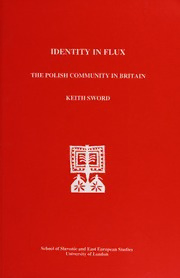
Identity in Flux, The Polish Community in Great Britain PDF
Preview Identity in Flux, The Polish Community in Great Britain
IDENTITY IN FLUX THE POLISH COMMUNITY IN BRITAIN KEITH SWORD School of Slavonic and East European Studies University of London Digitized by the Internet Archive in 2019 with funding from UCL School of Slavonic and East European Studies (SSEES) https://archive.org/details/SSEES0012 IDENTITY IN FLUX IDENTITY IN FLUX The Polish Community in Britain KEITH SWORD School of Slavonic and East European Studies University of London 1996 IDENTITY IN FLUX. THE POLISH COMMUNITY IN BRITAIN Keith Sword Identity in Flux. The Polish Community in Britain © School of Slavonic and East European Studies 1996 SSEES Occasional Papers No. 36 ISBN: 0 903425 60 2 All rights reserved. No part of this publication may be stored in a retrieval system, or transmitted in any other form or by any means, electronic, mechanical, recording or otherwise, without the prior permission of the School of Slavonic and East European Studies. Copies of this publication and others in the School’s refereed series of Occasional Papers can be obtained from the Publications and Conferences Office, SSEES, Senate House, Malet Street, London WC1E 7HU Printed in Great Britain by Quom Selective Repro Limited Queens Road, Loughborough, Leics. LEI 1 1HH Contents Acknowledgements vii List of Tables and Diagrams ix 1 Introduction Accounting for the Salience of Ethnicity 1 Defining Ethnicity 3 Approaches to the Problem 6 Polish Migration and Migration Research 10 Ethnicity and Nationalism 13 The Polish Minority in Britain 15 2 Historical Background Early History: Poles in Britain Prior to 1939 19 World War Two and the Establishment of a Political Emigre Settlement 22 Political Fragmentation and Economic Consolidation, 1947-56 29 From the Polish 'Thaw’ to Martial Law, 1956-81 39 The Political Struggle Comes to an End, 1982-91 49 3 Changed Directions and Orientations 59 4 Poles in Britain: The Demographic Picture 73 5 Structures of the Polish Community The Federation of Poles in Great Britain 87 The Polish Catholic Church in Great Britain 92 The Combatants’ Organizations 97 Cultural Institutions 103 The Polish Saturday School Movement 108 The Polish Scouting Movement 113 Self-Help and Welfare 116 Communication and Information Flow: Press and Publishing 120 6 The Local Community 125 7 The Culture and Traditions of the Polish Community 139 8 Upbringing, Identity and Community Family Background and Historical Awareness 149 Childhood and Upbringing in the Polish Community 154 v VI Contents Crossing Ethnic Boundaries: Discrimination, Stigma and Self-Esteem 162 Education and Social Mobility 168 The Homeland in Myth and Reality 111 Marriage, the Life Cycle and Cultural Continuity 183 Language and Identity 190 Identity and Religion 197 The Newcomers from Poland 204 Generations 215 Ethnic Identity: Self-Ascription and the Future of the Community 219 9 Conclusions 227 Select Bibliography 235 Acknowledgements I would like to express my gratitude to the M.B. Grabowski Fund and the Federation of Poles in Great Britain, whose financial support for the Polish Migration Project at the School of Slavonic and East European Stuudies made this study possible. Beyond this I owe much to the many people who have helped me by providing me with materials. Some of these people are acknowledged in the footnotes. They include Mr B. Brodzinski, Mr A. Gas, Ms Anna Fiderkiewicz, the former Polish Consul-General in London Mr J. Kochanowski, Mr L. Kliszewicz, Mr Andrew Nocon, Mr J. Palmi, Mr Thomas Scragg, Ms Bogusia Temple, Ms Helena Scott, Ms Ela Watrobska, Mr Szymon Zaremba and the Librarian of RAF College, Cranwell. I should add to this list my wife, Urszula, who kept me well supplied with the Polish Daily and other materials produced by the Polish Cultural Foundation. I would also like to thank the many people who took an active role in this study by inviting me into their homes, answering my questions and providing me with the names of further contacts. I enjoyed more hospitality than I could reasonably have expected. Although not all of these respondents demanded anonymity, I have thought it best to be consistent by concealing the identities of all those interviewed (with the exception of public figures such as priests and heads of community organizations) Consequently, I shall not list the many names here — although my respondents will know who they are and will no doubt recognize some of their words in the text. Finally, I would like to thank John Andrew who worked hard to transpose this text on computer disk and to edit it prior to publication. Keith Sword London, 1996
